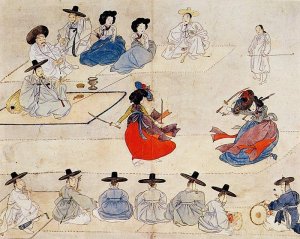If the wild historical liberties of fusion sageuk are grating on you, The Great King Sejong is a refreshing alternative. Hewing relatively closely to fact, it generates its dramatic power through complex characterizations and thoughtful explorations of moral quandaries. Sejong’s reign may have been lauded precisely for its lack of drama, but the writers find plenty of conflict to build engaging story lines around, as they explore the challenges of ruling with benevolence rather than terror. They do an excellent job exploring how political systems stymie or support progress, as they build a compelling argument for governing to the better angels of our nature. That being said, this is not a fast show to watch. There are no love triangles, gorgeous warriors with great hair, gravity defying ninja moves, or epic cliffhangers. Many of the best acted and most intriguing characters are the various grey-haired ministers in their matching robes and odd hats, who for once are given compelling personalities instead of serving as indistinguishable agents of repression.
The first half of the show is particularly strong, in part due to outstanding performances by Kim Young Chul as Taejong and Choi Myung Gil as his embittered queen. Taejong may be monstrous, but he’s also powerfully human, and the show loses some of its spark when he exits the scene. The second half is weaker, perhaps because the series was cut down from 100 episodes to 86. This causes pacing issues, as some events are rushed through while drawn-out moments of pathos feel unearned due to a lack of dramatic set-up. Subplots get dropped and major characters disappear without acknowledgment or comment. It also means that Sejong comes off as far more serious than perhaps he was, as the show leaves out such “frivolous” elements of his life as his love of music and his passionate relationships with his concubines. In general, the show is more comfortable in the elegiac than the celebratory mode, but its tendency to emphasize loss sometimes deflects attention from just how extraordinary Sejong’s achievements were. It may be difficult to do great things, but there is great joy in such success as well.
Esta resenha foi útil para você?

























